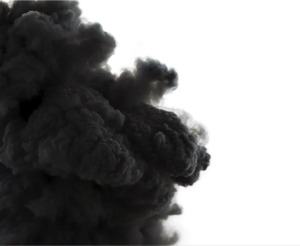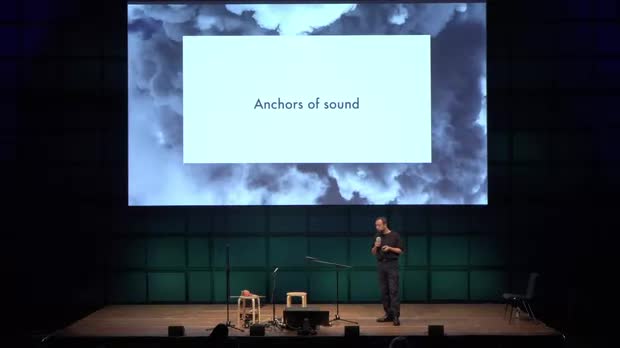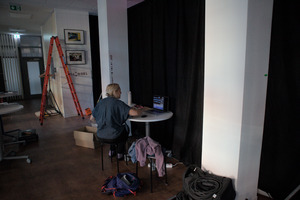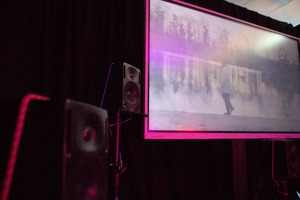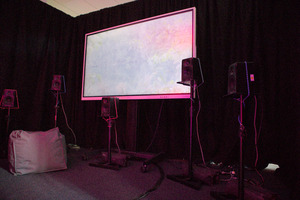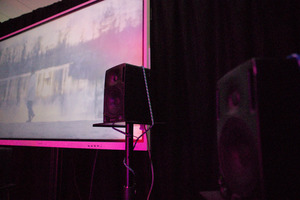"Karlsruhe City of Media Art"
| Begriff | Karlsruhe City of Media Art |
| Metakey | Beteiligte Institution(en) (creative_work:other_institutions) |
| Typ | Keyword |
| Vokabular | Werk |
96 Inhalte
- Seite 1 von 8
After Memory Postcards
- Titel
- After Memory Postcards
- Autor/in
- Beschreibung (en)
- The talk and live music-led meditation session draws on sound design, psychology, neuroscience, folklore and diasporic spirituality. Studies of Air and Smoke is both an art performance and a meta-educational intervention; it is neither a concert nor a lecture. Thiago Leiros-Costa explores the dualism between being an artist and a scientist, performing both roles in the same evening and exploring their connections. The first part of the session assesses the nature of attention and awareness, and how the brain and our expectations are vital in constructing our experience of the world around us. Participants are invited to approach the second part, a musical performance, as a meditation session. Prompts and triggers given during the talk will be explored in the course of the performance. The music will range from folk to free improvisation and sound design.
- Kategorie
- Typ des Projekts/Werks
- Datierung
- 25.10.2024
- Sprache
- Ort: Institution
- Ort
- Media Theater
- Stadt
- Land
- Beteiligte Institution(en)
- Internetlinks
- Titel
- After Memory Postcards
- Urheberrechtshinweis
- After Memory
- Rechtsschutz/Lizenz
- Beziehung/Funktion
- Importiert am
- 17.11.2024
- Übergeordnete Sets
- 1
After Memory Streamings
- Titel
- After Memory Streamings
- Autor/in
- Beschreibung (en)
- The talk and live music-led meditation session draws on sound design, psychology, neuroscience, folklore and diasporic spirituality. Studies of Air and Smoke is both an art performance and a meta-educational intervention; it is neither a concert nor a lecture. Thiago Leiros-Costa explores the dualism between being an artist and a scientist, performing both roles in the same evening and exploring their connections. The first part of the session assesses the nature of attention and awareness, and how the brain and our expectations are vital in constructing our experience of the world around us. Participants are invited to approach the second part, a musical performance, as a meditation session. Prompts and triggers given during the talk will be explored in the course of the performance. The music will range from folk to free improvisation and sound design.
- Kategorie
- Typ des Projekts/Werks
- Datierung
- 25.10.2024
- Sprache
- Ort: Institution
- Ort
- Media Theater
- Stadt
- Land
- Beteiligte Institution(en)
- Internetlinks
- Titel
- After Memory Streamings
- Urheberrechtshinweis
- After Memory
- Importiert am
- 08.11.2024
- Übergeordnete Sets
- 1
Ansichten von A Factor of Evolution in Triangel Studio
- Titel
- Ansichten von A Factor of Evolution in Triangel Studio
- Autor/in
- Beschreibung (en)
- We live in times of high competition. Survival of the fittest is the omnipresent motto in most fields of human action, especially in the western world. This philosophy was only established about 200 years ago and manifested by Charles Darwin and especially the Social Darwinists at the end of the 19th century. They believed that according to a law of nature, only the physically strongest and most aggressive individuals and species would survive in the struggle for life. Many Social Darwinists justified therefore capitalism and racism with devastating consequences in the coming decades until nowadays.
Peter Kropotkin is attempting in his philosophical work Mutual Aid: A Factor of Evolution (1902) to dismantle their arguments and based on numerous observations of zoologists and anthropologists, he proves, that the fittest species are the most sociable ones and that sociability develops intelligence, which is the most powerful arm in the struggle for survival. This includes insects, animals and humans. Higher moral sentiments and compassion is also essential for survival in all societies.
The ritual burning of sage in nature should help to cleanse the negative energy of social darwinism in our world and make room for a more cooperative society, that will secure the well-being of all members, even the most weak ones and furthermore facilitate a more sustainable, safe and content society.
- We live in times of high competition. Survival of the fittest is the omnipresent motto in most fields of human action, especially in the western world. This philosophy was only established about 200 years ago and manifested by Charles Darwin and especially the Social Darwinists at the end of the 19th century. They believed that according to a law of nature, only the physically strongest and most aggressive individuals and species would survive in the struggle for life. Many Social Darwinists justified therefore capitalism and racism with devastating consequences in the coming decades until nowadays.
- Typ des Projekts/Werks
- Schlagworte
- Datierung
- 07.06.2024
- Mitwirkende
- Ort: Institution
- Ort
- Karlsruhe
- Stadt
- Land
- Beteiligte Institution(en)
- Titel
- Ansichten von A Factor of Evolution in Triangel Studio
- Titel (en)
- Views of A Factor of Evolution in Triangle Studio
- Urheberrechtshinweis
- Tina Jander; photo: Víctor Fancelli Capdevila
- Rechtsschutz/Lizenz
- Freigabe Nutzung HfG
- Medienersteller/in
- Beziehung/Funktion
- Alternativ-Text (de)
- Ansichten von A Factor of Evolution in Triangel Studio
- Alternativ-Text (en)
- Views of A Factor of Evolution in Triangle Studio
- Importiert am
- 10.06.2024
- Übergeordnete Sets
- 1
Ansichten von A Factor of Evolution in Triangel Studio
- Titel
- Ansichten von A Factor of Evolution in Triangel Studio
- Autor/in
- Beschreibung (en)
- We live in times of high competition. Survival of the fittest is the omnipresent motto in most fields of human action, especially in the western world. This philosophy was only established about 200 years ago and manifested by Charles Darwin and especially the Social Darwinists at the end of the 19th century. They believed that according to a law of nature, only the physically strongest and most aggressive individuals and species would survive in the struggle for life. Many Social Darwinists justified therefore capitalism and racism with devastating consequences in the coming decades until nowadays.
Peter Kropotkin is attempting in his philosophical work Mutual Aid: A Factor of Evolution (1902) to dismantle their arguments and based on numerous observations of zoologists and anthropologists, he proves, that the fittest species are the most sociable ones and that sociability develops intelligence, which is the most powerful arm in the struggle for survival. This includes insects, animals and humans. Higher moral sentiments and compassion is also essential for survival in all societies.
The ritual burning of sage in nature should help to cleanse the negative energy of social darwinism in our world and make room for a more cooperative society, that will secure the well-being of all members, even the most weak ones and furthermore facilitate a more sustainable, safe and content society.
- We live in times of high competition. Survival of the fittest is the omnipresent motto in most fields of human action, especially in the western world. This philosophy was only established about 200 years ago and manifested by Charles Darwin and especially the Social Darwinists at the end of the 19th century. They believed that according to a law of nature, only the physically strongest and most aggressive individuals and species would survive in the struggle for life. Many Social Darwinists justified therefore capitalism and racism with devastating consequences in the coming decades until nowadays.
- Typ des Projekts/Werks
- Schlagworte
- Datierung
- 07.06.2024
- Mitwirkende
- Ort: Institution
- Ort
- Karlsruhe
- Stadt
- Land
- Beteiligte Institution(en)
- Titel
- Ansichten von A Factor of Evolution in Triangel Studio
- Titel (en)
- Views of A Factor of Evolution in Triangle Studio
- Urheberrechtshinweis
- Tina Jander; photo: Víctor Fancelli Capdevila
- Rechtsschutz/Lizenz
- Freigabe Nutzung HfG
- Medienersteller/in
- Beziehung/Funktion
- Alternativ-Text (de)
- Ansichten von A Factor of Evolution in Triangel Studio
- Alternativ-Text (en)
- Views of A Factor of Evolution in Triangle Studio
- Importiert am
- 10.06.2024
- Übergeordnete Sets
- 1
Ansichten von A Factor of Evolution in Triangel Studio
- Titel
- Ansichten von A Factor of Evolution in Triangel Studio
- Autor/in
- Beschreibung (en)
- We live in times of high competition. Survival of the fittest is the omnipresent motto in most fields of human action, especially in the western world. This philosophy was only established about 200 years ago and manifested by Charles Darwin and especially the Social Darwinists at the end of the 19th century. They believed that according to a law of nature, only the physically strongest and most aggressive individuals and species would survive in the struggle for life. Many Social Darwinists justified therefore capitalism and racism with devastating consequences in the coming decades until nowadays.
Peter Kropotkin is attempting in his philosophical work Mutual Aid: A Factor of Evolution (1902) to dismantle their arguments and based on numerous observations of zoologists and anthropologists, he proves, that the fittest species are the most sociable ones and that sociability develops intelligence, which is the most powerful arm in the struggle for survival. This includes insects, animals and humans. Higher moral sentiments and compassion is also essential for survival in all societies.
The ritual burning of sage in nature should help to cleanse the negative energy of social darwinism in our world and make room for a more cooperative society, that will secure the well-being of all members, even the most weak ones and furthermore facilitate a more sustainable, safe and content society.
- We live in times of high competition. Survival of the fittest is the omnipresent motto in most fields of human action, especially in the western world. This philosophy was only established about 200 years ago and manifested by Charles Darwin and especially the Social Darwinists at the end of the 19th century. They believed that according to a law of nature, only the physically strongest and most aggressive individuals and species would survive in the struggle for life. Many Social Darwinists justified therefore capitalism and racism with devastating consequences in the coming decades until nowadays.
- Typ des Projekts/Werks
- Schlagworte
- Datierung
- 07.06.2024
- Mitwirkende
- Ort: Institution
- Ort
- Karlsruhe
- Stadt
- Land
- Beteiligte Institution(en)
- Titel
- Ansichten von A Factor of Evolution in Triangel Studio
- Titel (en)
- Views of A Factor of Evolution in Triangle Studio
- Urheberrechtshinweis
- Tina Jander; photo: Víctor Fancelli Capdevila
- Rechtsschutz/Lizenz
- Freigabe Nutzung HfG
- Medienersteller/in
- Beziehung/Funktion
- Alternativ-Text (de)
- Ansichten von A Factor of Evolution in Triangel Studio
- Alternativ-Text (en)
- Views of A Factor of Evolution in Triangle Studio
- Importiert am
- 10.06.2024
- Übergeordnete Sets
- 1
Ansichten von A Factor of Evolution in Triangel Studio
- Titel
- Ansichten von A Factor of Evolution in Triangel Studio
- Autor/in
- Beschreibung (en)
- We live in times of high competition. Survival of the fittest is the omnipresent motto in most fields of human action, especially in the western world. This philosophy was only established about 200 years ago and manifested by Charles Darwin and especially the Social Darwinists at the end of the 19th century. They believed that according to a law of nature, only the physically strongest and most aggressive individuals and species would survive in the struggle for life. Many Social Darwinists justified therefore capitalism and racism with devastating consequences in the coming decades until nowadays.
Peter Kropotkin is attempting in his philosophical work Mutual Aid: A Factor of Evolution (1902) to dismantle their arguments and based on numerous observations of zoologists and anthropologists, he proves, that the fittest species are the most sociable ones and that sociability develops intelligence, which is the most powerful arm in the struggle for survival. This includes insects, animals and humans. Higher moral sentiments and compassion is also essential for survival in all societies.
The ritual burning of sage in nature should help to cleanse the negative energy of social darwinism in our world and make room for a more cooperative society, that will secure the well-being of all members, even the most weak ones and furthermore facilitate a more sustainable, safe and content society.
- We live in times of high competition. Survival of the fittest is the omnipresent motto in most fields of human action, especially in the western world. This philosophy was only established about 200 years ago and manifested by Charles Darwin and especially the Social Darwinists at the end of the 19th century. They believed that according to a law of nature, only the physically strongest and most aggressive individuals and species would survive in the struggle for life. Many Social Darwinists justified therefore capitalism and racism with devastating consequences in the coming decades until nowadays.
- Typ des Projekts/Werks
- Schlagworte
- Datierung
- 07.06.2024
- Mitwirkende
- Ort: Institution
- Ort
- Karlsruhe
- Stadt
- Land
- Beteiligte Institution(en)
- Titel
- Ansichten von A Factor of Evolution in Triangel Studio
- Titel (en)
- Views of A Factor of Evolution in Triangle Studio
- Urheberrechtshinweis
- Tina Jander; photo: Víctor Fancelli Capdevila
- Rechtsschutz/Lizenz
- Freigabe Nutzung HfG
- Medienersteller/in
- Beziehung/Funktion
- Alternativ-Text (de)
- Ansichten von A Factor of Evolution in Triangel Studio
- Alternativ-Text (en)
- Views of A Factor of Evolution in Triangle Studio
- Importiert am
- 10.06.2024
- Übergeordnete Sets
- 1
Ansichten von A Factor of Evolution in Triangel Studio
- Titel
- Ansichten von A Factor of Evolution in Triangel Studio
- Autor/in
- Beschreibung (en)
- We live in times of high competition. Survival of the fittest is the omnipresent motto in most fields of human action, especially in the western world. This philosophy was only established about 200 years ago and manifested by Charles Darwin and especially the Social Darwinists at the end of the 19th century. They believed that according to a law of nature, only the physically strongest and most aggressive individuals and species would survive in the struggle for life. Many Social Darwinists justified therefore capitalism and racism with devastating consequences in the coming decades until nowadays.
Peter Kropotkin is attempting in his philosophical work Mutual Aid: A Factor of Evolution (1902) to dismantle their arguments and based on numerous observations of zoologists and anthropologists, he proves, that the fittest species are the most sociable ones and that sociability develops intelligence, which is the most powerful arm in the struggle for survival. This includes insects, animals and humans. Higher moral sentiments and compassion is also essential for survival in all societies.
The ritual burning of sage in nature should help to cleanse the negative energy of social darwinism in our world and make room for a more cooperative society, that will secure the well-being of all members, even the most weak ones and furthermore facilitate a more sustainable, safe and content society.
- We live in times of high competition. Survival of the fittest is the omnipresent motto in most fields of human action, especially in the western world. This philosophy was only established about 200 years ago and manifested by Charles Darwin and especially the Social Darwinists at the end of the 19th century. They believed that according to a law of nature, only the physically strongest and most aggressive individuals and species would survive in the struggle for life. Many Social Darwinists justified therefore capitalism and racism with devastating consequences in the coming decades until nowadays.
- Typ des Projekts/Werks
- Schlagworte
- Datierung
- 07.06.2024
- Mitwirkende
- Ort: Institution
- Ort
- Karlsruhe
- Stadt
- Land
- Beteiligte Institution(en)
- Titel
- Ansichten von A Factor of Evolution in Triangel Studio
- Titel (en)
- Views of A Factor of Evolution in Triangle Studio
- Urheberrechtshinweis
- Tina Jander; photo: Víctor Fancelli Capdevila
- Rechtsschutz/Lizenz
- Freigabe Nutzung HfG
- Medienersteller/in
- Beziehung/Funktion
- Alternativ-Text (de)
- Ansichten von A Factor of Evolution in Triangel Studio
- Alternativ-Text (en)
- Views of A Factor of Evolution in Triangle Studio
- Importiert am
- 10.06.2024
- Übergeordnete Sets
- 1
Ansichten von A Factor of Evolution in Triangel Studio
- Titel
- Ansichten von A Factor of Evolution in Triangel Studio
- Autor/in
- Beschreibung (en)
- We live in times of high competition. Survival of the fittest is the omnipresent motto in most fields of human action, especially in the western world. This philosophy was only established about 200 years ago and manifested by Charles Darwin and especially the Social Darwinists at the end of the 19th century. They believed that according to a law of nature, only the physically strongest and most aggressive individuals and species would survive in the struggle for life. Many Social Darwinists justified therefore capitalism and racism with devastating consequences in the coming decades until nowadays.
Peter Kropotkin is attempting in his philosophical work Mutual Aid: A Factor of Evolution (1902) to dismantle their arguments and based on numerous observations of zoologists and anthropologists, he proves, that the fittest species are the most sociable ones and that sociability develops intelligence, which is the most powerful arm in the struggle for survival. This includes insects, animals and humans. Higher moral sentiments and compassion is also essential for survival in all societies.
The ritual burning of sage in nature should help to cleanse the negative energy of social darwinism in our world and make room for a more cooperative society, that will secure the well-being of all members, even the most weak ones and furthermore facilitate a more sustainable, safe and content society.
- We live in times of high competition. Survival of the fittest is the omnipresent motto in most fields of human action, especially in the western world. This philosophy was only established about 200 years ago and manifested by Charles Darwin and especially the Social Darwinists at the end of the 19th century. They believed that according to a law of nature, only the physically strongest and most aggressive individuals and species would survive in the struggle for life. Many Social Darwinists justified therefore capitalism and racism with devastating consequences in the coming decades until nowadays.
- Typ des Projekts/Werks
- Schlagworte
- Datierung
- 07.06.2024
- Mitwirkende
- Ort: Institution
- Ort
- Karlsruhe
- Stadt
- Land
- Beteiligte Institution(en)
- Titel
- Ansichten von A Factor of Evolution in Triangel Studio
- Titel (en)
- Views of A Factor of Evolution in Triangle Studio
- Urheberrechtshinweis
- Tina Jander; photo: Víctor Fancelli Capdevila
- Rechtsschutz/Lizenz
- Freigabe Nutzung HfG
- Medienersteller/in
- Beziehung/Funktion
- Alternativ-Text (de)
- Ansichten von A Factor of Evolution in Triangel Studio
- Alternativ-Text (en)
- Views of A Factor of Evolution in Triangle Studio
- Importiert am
- 10.06.2024
- Übergeordnete Sets
- 1
Ansichten von A Factor of Evolution in Triangel Studio
- Titel
- Ansichten von A Factor of Evolution in Triangel Studio
- Autor/in
- Beschreibung (en)
- We live in times of high competition. Survival of the fittest is the omnipresent motto in most fields of human action, especially in the western world. This philosophy was only established about 200 years ago and manifested by Charles Darwin and especially the Social Darwinists at the end of the 19th century. They believed that according to a law of nature, only the physically strongest and most aggressive individuals and species would survive in the struggle for life. Many Social Darwinists justified therefore capitalism and racism with devastating consequences in the coming decades until nowadays.
Peter Kropotkin is attempting in his philosophical work Mutual Aid: A Factor of Evolution (1902) to dismantle their arguments and based on numerous observations of zoologists and anthropologists, he proves, that the fittest species are the most sociable ones and that sociability develops intelligence, which is the most powerful arm in the struggle for survival. This includes insects, animals and humans. Higher moral sentiments and compassion is also essential for survival in all societies.
The ritual burning of sage in nature should help to cleanse the negative energy of social darwinism in our world and make room for a more cooperative society, that will secure the well-being of all members, even the most weak ones and furthermore facilitate a more sustainable, safe and content society.
- We live in times of high competition. Survival of the fittest is the omnipresent motto in most fields of human action, especially in the western world. This philosophy was only established about 200 years ago and manifested by Charles Darwin and especially the Social Darwinists at the end of the 19th century. They believed that according to a law of nature, only the physically strongest and most aggressive individuals and species would survive in the struggle for life. Many Social Darwinists justified therefore capitalism and racism with devastating consequences in the coming decades until nowadays.
- Typ des Projekts/Werks
- Schlagworte
- Datierung
- 07.06.2024
- Mitwirkende
- Ort: Institution
- Ort
- Karlsruhe
- Stadt
- Land
- Beteiligte Institution(en)
- Titel
- Ansichten von A Factor of Evolution in Triangel Studio
- Titel (en)
- Views of A Factor of Evolution in Triangle Studio
- Urheberrechtshinweis
- Tina Jander; photo: Víctor Fancelli Capdevila
- Rechtsschutz/Lizenz
- Freigabe Nutzung HfG
- Medienersteller/in
- Beziehung/Funktion
- Alternativ-Text (de)
- Ansichten von A Factor of Evolution in Triangel Studio
- Alternativ-Text (en)
- Views of A Factor of Evolution in Triangle Studio
- Importiert am
- 10.06.2024
- Übergeordnete Sets
- 1
Ansichten von A Factor of Evolution in Triangel Studio
- Titel
- Ansichten von A Factor of Evolution in Triangel Studio
- Autor/in
- Beschreibung (en)
- We live in times of high competition. Survival of the fittest is the omnipresent motto in most fields of human action, especially in the western world. This philosophy was only established about 200 years ago and manifested by Charles Darwin and especially the Social Darwinists at the end of the 19th century. They believed that according to a law of nature, only the physically strongest and most aggressive individuals and species would survive in the struggle for life. Many Social Darwinists justified therefore capitalism and racism with devastating consequences in the coming decades until nowadays.
Peter Kropotkin is attempting in his philosophical work Mutual Aid: A Factor of Evolution (1902) to dismantle their arguments and based on numerous observations of zoologists and anthropologists, he proves, that the fittest species are the most sociable ones and that sociability develops intelligence, which is the most powerful arm in the struggle for survival. This includes insects, animals and humans. Higher moral sentiments and compassion is also essential for survival in all societies.
The ritual burning of sage in nature should help to cleanse the negative energy of social darwinism in our world and make room for a more cooperative society, that will secure the well-being of all members, even the most weak ones and furthermore facilitate a more sustainable, safe and content society.
- We live in times of high competition. Survival of the fittest is the omnipresent motto in most fields of human action, especially in the western world. This philosophy was only established about 200 years ago and manifested by Charles Darwin and especially the Social Darwinists at the end of the 19th century. They believed that according to a law of nature, only the physically strongest and most aggressive individuals and species would survive in the struggle for life. Many Social Darwinists justified therefore capitalism and racism with devastating consequences in the coming decades until nowadays.
- Typ des Projekts/Werks
- Schlagworte
- Datierung
- 07.06.2024
- Mitwirkende
- Ort: Institution
- Ort
- Karlsruhe
- Stadt
- Land
- Beteiligte Institution(en)
- Titel
- Ansichten von A Factor of Evolution in Triangel Studio
- Titel (en)
- Views of A Factor of Evolution in Triangle Studio
- Urheberrechtshinweis
- Tina Jander; photo: Víctor Fancelli Capdevila
- Rechtsschutz/Lizenz
- Freigabe Nutzung HfG
- Medienersteller/in
- Beziehung/Funktion
- Alternativ-Text (de)
- Ansichten von A Factor of Evolution in Triangel Studio
- Alternativ-Text (en)
- Views of A Factor of Evolution in Triangle Studio
- Importiert am
- 10.06.2024
- Übergeordnete Sets
- 1
Ansichten von A Factor of Evolution in Triangel Studio
- Titel
- Ansichten von A Factor of Evolution in Triangel Studio
- Autor/in
- Beschreibung (en)
- We live in times of high competition. Survival of the fittest is the omnipresent motto in most fields of human action, especially in the western world. This philosophy was only established about 200 years ago and manifested by Charles Darwin and especially the Social Darwinists at the end of the 19th century. They believed that according to a law of nature, only the physically strongest and most aggressive individuals and species would survive in the struggle for life. Many Social Darwinists justified therefore capitalism and racism with devastating consequences in the coming decades until nowadays.
Peter Kropotkin is attempting in his philosophical work Mutual Aid: A Factor of Evolution (1902) to dismantle their arguments and based on numerous observations of zoologists and anthropologists, he proves, that the fittest species are the most sociable ones and that sociability develops intelligence, which is the most powerful arm in the struggle for survival. This includes insects, animals and humans. Higher moral sentiments and compassion is also essential for survival in all societies.
The ritual burning of sage in nature should help to cleanse the negative energy of social darwinism in our world and make room for a more cooperative society, that will secure the well-being of all members, even the most weak ones and furthermore facilitate a more sustainable, safe and content society.
- We live in times of high competition. Survival of the fittest is the omnipresent motto in most fields of human action, especially in the western world. This philosophy was only established about 200 years ago and manifested by Charles Darwin and especially the Social Darwinists at the end of the 19th century. They believed that according to a law of nature, only the physically strongest and most aggressive individuals and species would survive in the struggle for life. Many Social Darwinists justified therefore capitalism and racism with devastating consequences in the coming decades until nowadays.
- Typ des Projekts/Werks
- Schlagworte
- Datierung
- 07.06.2024
- Mitwirkende
- Ort: Institution
- Ort
- Karlsruhe
- Stadt
- Land
- Beteiligte Institution(en)
- Titel
- Ansichten von A Factor of Evolution in Triangel Studio
- Titel (en)
- Views of A Factor of Evolution in Triangle Studio
- Urheberrechtshinweis
- Tina Jander; photo: Víctor Fancelli Capdevila
- Rechtsschutz/Lizenz
- Freigabe Nutzung HfG
- Medienersteller/in
- Beziehung/Funktion
- Alternativ-Text (de)
- Ansichten von A Factor of Evolution in Triangel Studio
- Alternativ-Text (en)
- Views of A Factor of Evolution in Triangle Studio
- Importiert am
- 10.06.2024
- Übergeordnete Sets
- 1
Ansichten von A Factor of Evolution in Triangel Studio
- Titel
- Ansichten von A Factor of Evolution in Triangel Studio
- Autor/in
- Beschreibung (en)
- We live in times of high competition. Survival of the fittest is the omnipresent motto in most fields of human action, especially in the western world. This philosophy was only established about 200 years ago and manifested by Charles Darwin and especially the Social Darwinists at the end of the 19th century. They believed that according to a law of nature, only the physically strongest and most aggressive individuals and species would survive in the struggle for life. Many Social Darwinists justified therefore capitalism and racism with devastating consequences in the coming decades until nowadays.
Peter Kropotkin is attempting in his philosophical work Mutual Aid: A Factor of Evolution (1902) to dismantle their arguments and based on numerous observations of zoologists and anthropologists, he proves, that the fittest species are the most sociable ones and that sociability develops intelligence, which is the most powerful arm in the struggle for survival. This includes insects, animals and humans. Higher moral sentiments and compassion is also essential for survival in all societies.
The ritual burning of sage in nature should help to cleanse the negative energy of social darwinism in our world and make room for a more cooperative society, that will secure the well-being of all members, even the most weak ones and furthermore facilitate a more sustainable, safe and content society.
- We live in times of high competition. Survival of the fittest is the omnipresent motto in most fields of human action, especially in the western world. This philosophy was only established about 200 years ago and manifested by Charles Darwin and especially the Social Darwinists at the end of the 19th century. They believed that according to a law of nature, only the physically strongest and most aggressive individuals and species would survive in the struggle for life. Many Social Darwinists justified therefore capitalism and racism with devastating consequences in the coming decades until nowadays.
- Typ des Projekts/Werks
- Schlagworte
- Datierung
- 07.06.2024
- Mitwirkende
- Ort: Institution
- Ort
- Karlsruhe
- Stadt
- Land
- Beteiligte Institution(en)
- Titel
- Ansichten von A Factor of Evolution in Triangel Studio
- Titel (en)
- Views of A Factor of Evolution in Triangle Studio
- Urheberrechtshinweis
- Tina Jander; photo: Víctor Fancelli Capdevila
- Rechtsschutz/Lizenz
- Freigabe Nutzung HfG
- Medienersteller/in
- Beziehung/Funktion
- Alternativ-Text (de)
- Ansichten von A Factor of Evolution in Triangel Studio
- Alternativ-Text (en)
- Views of A Factor of Evolution in Triangle Studio
- Importiert am
- 10.06.2024
- Übergeordnete Sets
- 1
